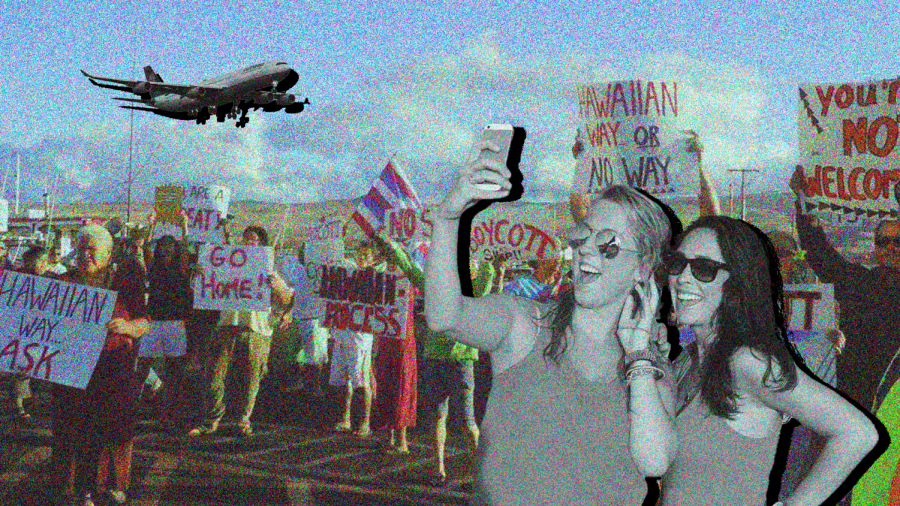Torres: The Islands Aren’t Your School Break Resort
(Design by Claire Peterson | The Daily Utah Chronicle)
September 26, 2022
Hawai’i and the Caribbean Islands, namely Puerto Rico, are exoticized and exploited to provide a “paradise” experience for mainlanders to the detriment of islanders. Colonization stole these islands from their people, and they continue to suffer from its effects through neocolonialist practices and unwelcome tourism. Now, with historic landmarks destroyed and beaches marred, residents of the islands are taking a stand against the mistreatment of their land and people.
A Brief History of Colonization in Hawai’i and Puerto Rico
Hawai’i did not willingly join the United States. The moment American soldiers set food on their land, colonial violence destroyed the nation and stripped native Hawaiians of their autonomy. In 1893, the Sovereign Kingdom of Hawai’i was illegally overthrown by the U.S. government, and shortly after, the native Hawaiian language was banned. Meanwhile, American military presence proliferated on the archipelago, bringing mainland diseases that decimated Hawaiian natives.
Puerto Rico, one of the world’s oldest colonies, had been under Spanish rule when the U.S. took control in 1898. It’s a colony without sovereign independence of its own and has been at the disposal of its settlers for centuries. Early sugar plantations on the island hired natives and paid them poverty wages, and American women benefit from birth control blind to the fact that Puerto Rican women were used to test it.
We must not forget the colonial history of the islands. It is imperative that we analyze the victimization of these nations with the aim of discontinuing exploitation.
Effects of Tourism in Hawai’i
Tourists fail to give the islands’ culture and land the respect it deserves. “We feel disrespect towards our people, our culture, our ʻāina, and wildlife,” said Monica Owens, a Hawai’i native from Kapolei O’ahu. “[Tourists] feel they have some sort of entitlement.”
As long as there is demand for tourism in the islands, businesses will find ways to supply. But it comes at the cost of cultural landmarks. In Hawai’i, a 22-acre ancient burial site near Keoneloa was torn up and relocated to a single-acre burial site on a resort for use as the main attraction. Even in death, exploitation of native Hawaiians for settler profit continues.
“If you come to our island and you want to learn about our culture, and you respect us and our wildlife, absolutely come visit us,” Owens expressed. “But when you come because you want to post pictures on Instagram that you are on the beach in Hawaii, just stay home.”
U.S. government rule disregards the needs of native Hawaiians in favor of the tourist economy. In Maui, a water shortage last year devastated residents, yet surplus water usage fines mocked these residents as hotels and resorts circumvented restrictions. As a result, tourists can dismiss their impact on the island, instead taking great care to find their perfect island souvenir.
“It’s not as simple as taking a vacation to Yellowstone,” Owens remarked. “You’re visiting an entire island and a very delicate population.”
Thanks to tourism, the high cost of living makes it difficult for Hawaiians, with 73% living in vulnerable financial situations. Nevertheless, Hawaiians fight back, with Honolulu introducing legislation requiring all short-term rental stays to be a minimum of 90 days.
“This is about protecting our place,” said Honolulu Mayor Rick Blangiardi in a statement regarding a surge in Airbnbs. “First and foremost, this is about getting our residential neighborhoods back. This is a form of managing tourism, but it’s also about getting housing back on the market and protecting the natural resources on O‘ahu for decades to come.”
Effects of Tourism in Puerto Rico
Coastal gentrification in Puerto Rico plagues Boriquas, which is a term used to describe native Puerto Ricans that comes from their native language. As a people proud of their land, Boriquas take special care of their beaches, and by law, all beaches in Puerto Rico must have public access. But developers skirt the law by privatizing the land surrounding the beaches and blocking beach entrances.
After Hurricane Maria, an apartment complex rebuilt its private pool on a public beach, which is home to an endangered breed of hawksbill sea turtle. Boriquas rightfully protested this violation of their land and were met with government police presence. A year later, activists took matters into their own hands and tore down the illegal pool, but the conflict illustrated the government’s priority of protecting outsiders’ private property.
Beachfront pools aren’t the only way tourism destabilizes Puerto Rican cities. The Puerto Rican government offers tax breaks to American citizens who move to the island in an effort to bring revenue into the economy. This government-sponsored gentrification led to a rise in the cost of living for Boriquas — residents can no longer afford rent, and their beloved landmarks have been flooded by colonizing tourists.
“It feels like Hurricane Maria placed a ‘For Sale’ sign on the island,” said Gloria Cuevas Viera, a resident of Puerto Rico. The tax break commodifies the everyday life of Boriqua into a sightseeing tour for rich Americans.
In the past two decades, the Puerto Rican government has destroyed affordable housing in favor of selling land to Americans. A resident displaced by an American landlord taking advantage of the tax break said, “I call them colonizing invaders because that’s how they act.” Even Puerto Rican musician Bad Bunny uses his platform to highlight the plight of Boriquas, with his latest music-video-turned-investigative-documentary, “Aquí Vive Gente.”
Americans reap the rewards of islander labor when they participate in unwelcome tourist economies. Our privilege as mainlanders allows us to book vacations to the islands, for the low price of environmental destruction and cultural erasure.
Your vacation does not take precedence over island citizens in crisis. As your spring break group chat scopes potential vacation packages, I implore you to remember the words of the islanders: “Gringo Go Home.”










Aquatic based lifeform • Sep 28, 2022 at 6:27 am
Great article – a real high IQ take! The greatest economic sector in Hawaii for example is tourism so it makes sense that people should be dissuaded from taking a vacation there. An estimated $16 billion in revenue and countless jobs could be reduced to $0 and loss of jobs which would benefit the people of Hawaii in countless ways. People should be think seriously about their harmful effects from being a tourist. Save your money and save the climate -STAY HOME AND BINGE WATCH TV
Hohn Jedberg • Sep 30, 2022 at 9:36 pm
i love how you did not read the article. really ‘high iq’ of you ig
John Hedberg • Sep 26, 2022 at 5:42 pm
Slavery is the history and practice of every people in every part of the world. If you’re alive right now and reading this, it’s because some of your ancestors once took slaves, and some of your ancestors were enslaved, and it doesn’t matter whether your heredity is Polynesian or other Asian, Native American, European, African, Australian, or some combination: if you’re alive and reading this, you are the child of slavers and enslaved. That’s the history of the world, as wrong as it is, and it’s only in recent generations that anyone even thought this would change, with the rise of Democracy, self-government, and the first few governments that ended slavery, mostly in the Christian West over 150 years ago. Before that time, there were very few places on Earth throughout all of history where slavery wasn’t the norm, whether you called them slaves (like the Slavic people), serfs, indentured servants, or criminalized forced labor (like many places in China today, where it’s illegal to be diverse or practice Falun Gong, and anyone with a low “social credit score” can have their organs or fetuses involuntarily harvested).
The Chronicle, as usual, seems to get a lot of their perspective from the ideology of Marxism, which seeks to divide civilizations by pitting groups against each other out of deliberately exaggerated hatreds, while saying hatred is wrong, and claiming they’re here to save everyone from “oppressors” out of a compassion they never actually practice themselves, while the very first thing they do to “rescue” the oppressed when they take power is to starve and imprison the very populace they said they were here to save (look at Russia in 1917, China since 1947, Venezuela for the last decade, Cambodia, Cuba, North Korea, and a long long list of examples of enslavement and genocide all through the 20th century and into the 21st). So, for The Chronicle and Marxist racists, the most important thing is to identify “the enemy” Marxism is trying to save us from this time, in this case, people of white European ancestry: “Gringos”!
The Caribbean Islands, including Puerto Rico, were actually colonized and enslaved by Hispanics and Portuguese, with occasional British island colonies. They were incredibly brutal towards the natives, just as the Arabs were towards the Europeans they captured all through the Ottoman era, as the Egyptians were towards the Jews they kept in slavery for 400+ years, and as the Aztecs were towards their neighbors, based on the pyramids of skulls found of folks who were regularly sacrificed to keep these oppressors safe from their “gods”. Slavery and conquest were just as prevalent among the Chinese dynasties, the Japanese, sub-continental India, the Mongol Empire, Persians, Arabs, and the African kings who regularly conquered and enslaved their neighbors and sold them in exchange for luxury items up until European colonialization arrived, and often even afterwards.
Hawaii, if The Chronicle would be reminded, was very nearly conquered and enslaved by the Japanese Emperor at the end of 1941, less than 100 years ago, and based on how “he” (is this the right pronoun?) treated other peoples his troops conquered, I think the Hawaiians caught a break when the Japanese fleet suffered an unexpected loss at Midway, since those carriers would have soon made the Hawaiians about as welcome in their own lands as the Chinese who were being exterminated by His Imperial Majesty’s troops on the Chinese mainland at the same moment.
So, today, all Puerto Ricans are Americans, and if they wanted to be a state, they can choose this any time they vote for it. The ones who dispossessed and spoilt and colonized native Puerto Rico were really Hispanics, for centuries, and did those they colonized have a vote?
So too today in Hawaii. According to Wikipedia(lol), the top 2 colonial ethnic groups in Hawaii in 2008 were Filipinos (Asian, 13.6%) and Japanese (Asian, 12.6%), followed by Hawaiian, German, Irish, English, Portuguese, Chinese, Korean, Mexican, and Puerto Rican (those ‘Hispanic colonialists’ again~!). In fact, by continent, Asians (native Hawaiians aside) were the largest colonial group in 2020 at 26.4%. What’s incredibly interesting about Hawaii, something Dr. Martin Luther King Jr. noted during his tenure, is that Hawaii has become a beautiful testing ground for diversity, equality, and inclusion, with 25.3% in 2020 belonging to “2 or more races”. As Tulsi Gabbard (D-HI) pointed out during her 2020 presidential campaign, Dr. King thought Hawaii and its culture were symbolic of the hope of humanity’s future.
Anyway, if you’re racist against pale-skinned Euro’s, Marxism is definitely the way to go, since Marxists pointedly ignore the worldwide history of oppression and slavery among every other group, including their own rabid history of genocide and totalitarianism, and only foment hatred and division among the cultures and peoples which ended slavery, since this makes those cultures the greatest evil of all! Lol 😋
Does anyone ever open a book here at the chronicle?
Meanwhile, I submitted a compliment for an excellent photo, and I was told it was “threatening speech” they refused to print, but if any Chronicle staff member wants to paint innocent millions of people as dangerous racist oppressors, including people who resemble students here on this campus… well, there’s nothing hateful, incendiary ,or threatening about anything written by staff at the Chronicle, now is there? 😂
Look at yourselves~!
Best Regards, with Love,
J Hedberg